|
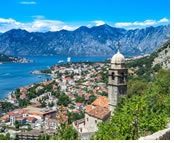 Explore lesser known countries in the Balkans, this tour includes the best sites to see in Montenegro, Albania & Macedonia. Albania's stunning mountain scenery, crumbling castles, boisterous capital and dreamy beaches rivalling any in the Mediterranean continue to enchant, but hurry here because as word gets out to what Albania is hiding, the still tiny trickle of tourists threatens to become a flood. Part Balkan, part Mediterranean and rich in Greek, Roman and Ottoman heritage, Macedonia has a fascinating past and a complex national identity. Bursting at the seams with majestic mountains, breathtaking beaches and larger-than-life locals, minuscule Montenegro proves once and for all that good things do indeed come in small packages. Explore lesser known countries in the Balkans, this tour includes the best sites to see in Montenegro, Albania & Macedonia. Albania's stunning mountain scenery, crumbling castles, boisterous capital and dreamy beaches rivalling any in the Mediterranean continue to enchant, but hurry here because as word gets out to what Albania is hiding, the still tiny trickle of tourists threatens to become a flood. Part Balkan, part Mediterranean and rich in Greek, Roman and Ottoman heritage, Macedonia has a fascinating past and a complex national identity. Bursting at the seams with majestic mountains, breathtaking beaches and larger-than-life locals, minuscule Montenegro proves once and for all that good things do indeed come in small packages.
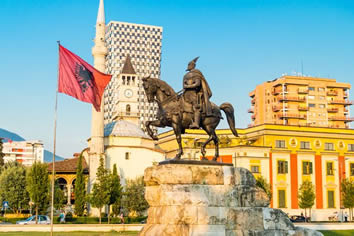
• Individual & Small Group suggested tour
• Featuring: Skopje - Ohrid - Berat - Tirana - Shkodra - Kotor - Budva
• Explore Skopje where ancient history and buzzing modernity collide
• Enjoy a tour in the beautiful Ohrid, one of oldest settlements in Europe
• Live Tirana, capital city of Albania and meet the local LGBT organization
• Visit Rozafa fort, situated on a cliff above Skadar
• Admire Kotor, a UNESCO World Heritage Site
• LGBT Friendly Tour Guide for Gaily Tours and Excursions
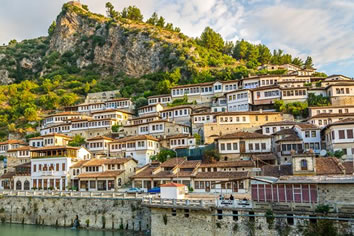
Day 1 -
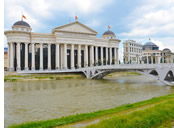 • Arrival transfer from airport to your hotel. • Arrival transfer from airport to your hotel.
• Accommodation and free time for shopping and dinner.
• Overnight at your hotel.
Skopje is the capital of the Republic of Macedonia, in the center of the Balkan Peninsula. Skopje has plenty of charm. Its Ottoman- and Byzantine-era sights are focused around the city's delightful Caršija, bordered by the 15th-century Kameni Most (Stone Bridge) and Tvrdina Kale Fortress – Skopje's guardian since the 5th century. Don't miss the excellent eating and drinking scene in Debar Maalo, a lovely tree-lined neighbourhood.
Day 2 -
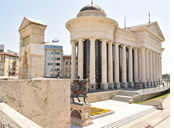 • Buffet Breakfast and enjoy a LGBT Friendly city tour with a local guide. • Buffet Breakfast and enjoy a LGBT Friendly city tour with a local guide. • Admire Skopje - the capital city of Macedonia - that lies in the heart of the Balkan Peninsula, at the crossroad of important communications, a city with a 2000 years old tradition. • Skopje is a very attractive tourist destination with its fortress, cultural and historical monuments, archaeological sites, sport halls, caves in the canyon of the River Treska and Lake Matka and a health spa in the eastern part of the city. • The town with the beautiful quay of the Macedonian river “Vardar”, the narrow streets in the Old Bazaar which is the biggest bazaar preserved in the Balkans today, the town is internationally famous for being the birthplace of Mother Teresa. • After the tour, free time for lunch in a local restaurant. • In the afternoon transfer to Ohrid with private car or minibus. • On the way possibility to stop and visit Matka canyons (45 min driving from Skopje). • There you can visit the Monastery of Matka dedicated to the Dormition of the Most Holy Mother of God, a religious festival celebrated on 28th August every year. The monastery is located on the left bank of the River Treska and was built around 1337. • Afterwards continue to walk along the bank of the River Treska – which is famous for the competitions in kayaking that take place on it. Follow the path that goes by the dam and the man-made lake Matka and we reach the Monastery of St. Andrew. • Late afternoon arrival in Ohrid. • Accommodation, dinner on your own and overnight in Ohrid.
Day 3 -
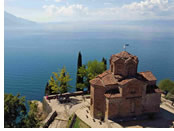 • Buffet Breakfast and meeting with our LGBT Friendly Tour Guide for a special 3-hours walking tour. • Buffet Breakfast and meeting with our LGBT Friendly Tour Guide for a special 3-hours walking tour. • Explore Ohrid, situated on the shores of Lake Ohrid, one of the oldest human settlements in Europe. Built mainly between the 7th and 19th centuries, it has the oldest Slav monastery (St Pantelejmon) and more than 800 Byzantine-style icons dating from the 11th to the end of the 14th century. After those of the Tretiakov Gallery in Moscow, this is considered to be the most important collection of icons in the world. • In the afternoon we suggest to make a boat tour in Lake or just relax in the shore of Lake Ohrid. • Accommodation, dinner on your own and overnight in Ohrid.
Day 4 -
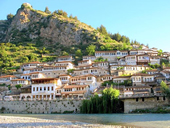 • Buffet Breakfast and leave Macedonia to visit another country, Albania. • Buffet Breakfast and leave Macedonia to visit another country, Albania. • On the way short stop in Elbasan. Located at the Shkumbini River, where it crosses the famous Egnatia Road, the city of Elbasani – ancient Scampini. In ancient times, Scampini was a typical Roman fortification, but in the 4th century it received a new administrative status and, with its new name Hiscampis, it became one of the major cities of the new Epirus, home of the area’s only Roman legion. • Today, tourists can visit the Church of Saint Mary, the King Mosque (inside the city walls), the Mosque of Naziresha (very rare because of its feminine name), and the Ethnographic Museum, the newly discovered basilica and the Turkish bath (hammam). • Afterwards continue to Berat, where our local guide is waiting for 2h guided tour. • Berat, a 2,413 years-old city known as Antipatrea, is under the protection of UNESCO, and it's a treasuretrove of Albanian history, culture and a testament to the country’s tradition of religious harmony. • The three major neighborhoods of the old city are Mangalemi, Gorica, and Kala, where the castle itself is located and is made unique by the fact that people continue to live inside of it. • The post-Byzantine monumental Cathedral of Shën Maria (Saint Mary) today houses a museum of works by the famous iconographers of the 16th century: Onufri and his son Nikolla. There are over 100 icons on display and they also include works of other artists such as Joan Çetiri, OnufërQiprioti and many anonymous painters. Ottomans occupation has left its mark as well. • Accommodation, dinner on your own and overnight in Berat.
Day 5 -
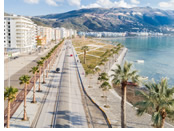 • Buffet Breakfast and transfer to Vlora (2h driving). • Buffet Breakfast and transfer to Vlora (2h driving). • Vlora is one of Albania’s larger towns and the country’s second port after Durres. It is the city where Albanian independence was declared on November 28 1912 and was for a short time the capital of Albania. Founded as the ancient Greek colony of Aulon in the 6th century BC it remained important throughout the subsequent 26 centuries. • Vlora is home to the port and to a university and is the most important economic and cultural centre in southwestern Albania. • As well we suggest driving to LLogara national Park. This national park, with its alpine setting of mountains and pines and the surrounding mountains, is used mainly for hiking and trekking tours. It is the gateway to the Rivieria to the south with magnificent views south along the Ionian coastline. • Afternoon transfer to Tirana. If time permit short stop in Durres. • Durres - Is the second largest city in Albania and a chief seaport. Some 21 miles (33km) west of the capital Tirana. It is one of the most ancient and economically important cities of Albania. Founded in the 7th century BC by Greek colonists from Corinth and Corfu it was initially known as Epidamnos, and has been continuously inhabited for the subsequent 2700 years. The remains of its city walls and amphitheater are still to be seen. • Accommodation, dinner on your own and overnight in Tirana
Day 6 -
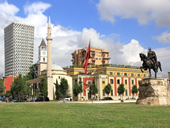 • Buffet Breakfast and full day to explore city of Tirana with a very special LGBT oriented thematic and twist tour. • Buffet Breakfast and full day to explore city of Tirana with a very special LGBT oriented thematic and twist tour. • Tirana, Albania’s bustling modern capital city, lies to the east of the Dajti Mountains and the coastal plains. Arriving in the bustling capital you will visit the National Historical Museum, the country’s largest museum with displays of all aspects of Albania’s history. • While touring the city you will see landmarks and monuments that date back to the Romans, Byzantines and Turks; the Et’hem Bey Mosque and clock tower; and also monuments to the Italian and communist eras including the Pyramid, Enver Hoxha’s cenotaph. The gaily painted communist buildings, the result of a major reclamation project are world famous, and the city now boasts numerous highrise towers and trade centre. • For the ultimate perspective of Tirana we shall ride the Dajti Express cable car to the top of Dajti Mountain, nearly 5300 feet above sea level. • In the afternoon/evening experience a meeting with LGBT organization in Tirana. • Accommodation, dinner on your own and overnight in Tirana.
Day 7 -
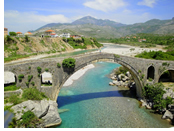 • Buffet Breakfast and transfer to the Albanian historical city of Kruja. • Buffet Breakfast and transfer to the Albanian historical city of Kruja. • This is a medieval town located 32 km northwest of Tirana and 20 minutes from Tirana international Airport. In Kruja you can visit national ethnographic museum and Skanderbeg museum, both located in Kruja castle. It was from this fortress that Albania’s hero – George Kastrioti Skanderbeg – defended the country from Ottoman invasion over a period spanning three decades. From the castle you haves views of the Adriatic Sea. Kruja is one of Albania’s most important and popular tourist attractions. • After optional lunch in one of the local restaurant enjoying traditional food we transfer to Shkodra. • Shkodra- known as the “capital of north Albania” is one of the oldest cities in the country, founded in the 4th century B.C. as the center of the Labeat tribe of Illyrians. • Shkodra’s main tourist attraction is Rozafa Castle. Rising majestically upon a rocky hill west of the city, the outcroppings and battlements paint a blazing picture against the setting sun. It is surrounded by the waters of three rivers; the Drini, Buna, and Kiri. Dinner on your own. • Accommodation, dinner on your own and overnight in Shkodra.
Day 8 -
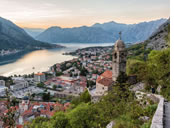 • Buffet Breakfast and be ready to explore another Balkan country, Montenegro. • Buffet Breakfast and be ready to explore another Balkan country, Montenegro. • Morning Transfer to border and after procedures continue to Kotor. • On the way stop and admire from outside the small island of Sveti Stefan. • Kotor – UNESCO site and see the Old City of Kotor, the Clock tower, the Napolean’s Theatre, the Cathedral of Saint Tryphon, the Church of St Luke, Drago, Pima and Grgur Palace, the Maritime Museum and the Ancient City Walls. • In the afternoon transfer to Budva for check in at the hotel and free time to explore the Old Town, the Fortress Citadel, the Church of St. Ivan and St. Trinity. • Accommodation, dinner on your own and overnight in Budva.
Day 9 -
• Breakfast in the hotel and transfer to the Podgorica airport.
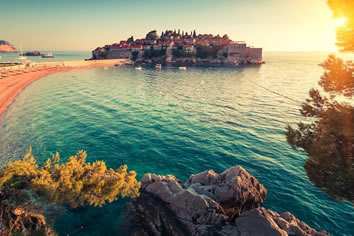
|